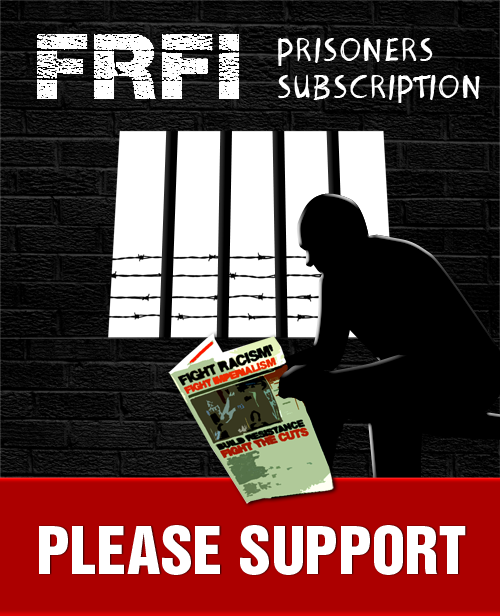Gang culture vs solidarity
- Details
- Created: Saturday, 11 May 2024 09:53
- Written by John Bowden
Prison culture in Britain is increasingly replicating the US prison gang system and destroying the solidarity that existed in long-term prisons, especially during the 1960s-90s, frequently manifesting itself in rebellions and uprisings. The growth of gang culture and violence in British prisons in the past 20 years is actively encouraged by staff to keep prisoners divided and disempowered. John Bowden reports.
Most gangs in British prisons are not based specifically on ethnic origin or religious affiliation. Unlike in the US, where racist prison gangs like the Aryan Brotherhood have existed since the 1960s and played a significant role in dividing prisoners and creating conflict among them, it is only very recently that racist and ethnically divided prison gangs have become active within the British long-term prison system.
Racists organise in the CSC
Although a growing culture of racist prisoners banding together does exist within the system, the overt existence of racist gangs on mainstream wings and cellblocks is negligible. This is clearly down to the strength in numbers and organisation of BAME prisoners and organised Muslim groups.
Where organised racist prisoners have managed to successfully cause confrontation and damage, it is within the most isolated corners of the high security prison system, in segregation units and Close Supervision Centres (CSCs). There they have formed a sort of subterranean gang that focuses its hatred and violence on Muslim prisoners.
The CSC system, created in the late 1990s to contain the ‘most dangerous and unmanageable’ prisoners has been used disproportionately to hold Muslim prisoners, who are confined in units with regimes amounting to mental torture.
The main racist gang currently operating in the British prison system is called Death Before Dishonour (DBD). In 2016 a security briefing was sent to prison governors warning them of the gang’s emergence; however both the Ministry of Justice and the Prison Officers Association (POA) denied there was any problem.
DBD was formed originally in Wakefield CSC and has spread its influence to CSC units and segregation blocks in the high security prison system. As a result, Muslim CSC prisoners have been subjected to constant verbal abuse, sometimes escalating to physical attack from DBD prisoners. This has been well-documented and, in at least one case, has been the subject of successful litigation against the Ministry of Justice for failing to protect a prisoner from ‘racist and religiously motivated abuse and assaults from other prisoners’ over a period of seven years.
The CSC is a ‘closely supervised’ environment where physical contact and interaction between prisoners is severely restricted and regulated by the guards. Nothing can happen there without the knowledge and collusion of prison staff. Within this environment, where the guards control totally the lives of prisoners, the DBD gang has become a part of the fabric of repression and violence. This is both known and colluded with by all levels of staff involved in the operation of the CSC, including the prison psychiatrists, who play a central role in enforcing the ‘behaviour modification’ regime.
Collective solidarity
At the height of the Covid pandemic, prisons were placed on total lockdown and the gang culture began gradually to be replaced by a collective mood of anger against those enforcing the lockdown and subjecting all prisoners to regimes of total solitary confinement. Four years later the lockdown of many prisons remains in place because the POA claims it has allowed guards to regain control of an increasingly violent prisoner population. Last year in Whitemoor maximum security prison there were a series of collective revolts by prisoners, who had been briefly unlocked for exercise and who took the opportunity to seize control of parts of the cell block. Riot squads responded with tear gas, stun grenades and violence, defining more sharply for the prisoners who their real enemy is and the necessity of solidarity and collective struggle in resisting and fighting back. The only way to confront racist gangs and the prison gang culture in general is by the active rebuilding of solidarity between prisoners to oppose the system that oppresses them.
FIGHT RACISM! FIGHT IMPERIALISM! 299 April/May 2024




